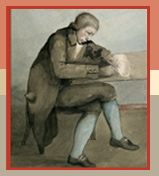
Iolo's People
Edward 'Celtic' Davies (1751-1831)
Evan Davies (Myfyr Morganwg, 1801-88)
Walter Davies (Gwallter Mechain, 1761–1849)
T C Evans (Cadrawd, 1846-1914)
Sir John Morris Jones (1864-1929)
William Owen Pughe (1759-1835)
William John Roberts (Gwilym Cowlyd, 1828-1904)
David Samwell (Dafydd Ddu Feddyg, 1751–98)
David Thomas (Dafydd Ddu Eryri, 1759–1822)
Griffith John Williams (1892-1963)
John Williams (Ab Ithel, 1811-62)
Owen Jones (Owain Myfyr, 1741-1814)
A native of Llanfihangel Glyn Myfyr, Denbighshire, Owen Jones was known by the bardic name Owain Myfyr. He moved to London as a youth and was apprenticed to a furrier. By the 1780s he owned his own business and had amassed a large fortune. His literary interests were cultivated by the London-Welsh societies: he was a member of the Honourable Society of Cymmrodorion and in 1770 he co-founded a new society, the Gwyneddigion Society. Owen Jones was a shy, unassuming man who avoided the limelight, but he generously used his private fortune to promote the cultural activities of these societies.
He collected and transcribed poems by Dafydd ap Gwilym, which he edited with William Owen Pughe. He bore the cost of publishing Barddoniaeth Dafydd ab Gwilym (1789) and the three substantial volumes, The Myvyrian Archaiology of Wales (1801-7). He is considered one of the most important patrons of his day.
Iolo became acquainted with Owen Jones in the early 1770s through John Walters. Their early letters reveal that they were kindred spirits. They discussed their cultural interests with enthusiasm and, for a while at least, they endeavoured to correspond through the medium of Welsh (Iolo Morganwg to Owen Jones, 12 January 1777 (NLW 1808Eii, no. 1519); Owen Jones to Iolo Morganwg, 11 July 1779). Their letters are also testimony to the valuable social function that the London-Welsh societies fulfilled: they often ask after other members, and sometimes exchange poems of a witty and racy nature.
However, Iolo and Owen Jones's relationship was not straightforward, mainly because Owen Jones was Iolo's patron as well as his friend. As they collaborated on The Myvyrian Archaiology of Wales their friendship came under immense strain, despite William Owen Pughe's attempts to mediate between them.
From about 1798 onwards Pughe began work on The Myvyrian Archaiology of Wales and Owen Jones expected Iolo to assist him. However, Iolo had difficulty allocating enough time to do the work and as a result Owen Jones feared that he was not pulling his weight and that he was furthering the Unitarian cause at the expense of their important cultural project. Owen Jones believed that Iolo was taking advantage of him financially. His fears in this respect were intensified because his own business was losing money.
Iolo's version of events were different, as one bitter letter drafted to Owen Jones reveals Iolo Morganwg to Owen Jones (5 April 1806). Iolo had been disappointed by Owen Jones's failure to secure him an annual payment of £50 which would free him from his work as a stonemason and enable him to realize his dream of becoming a professional writer. Frustrated that his friends did not understand his plight, he became convinced that they had both deliberately misled and deceived him: 'William Owen, a chydag ef Owen Myfyr, a ellir yn gyfiawn eu cymharu a Suddas, pob un megis a chyfarch teg a chusan, yn bradychu.' (William Owen, and with him Owen Myfyr, may justifiably be compared to Judas, each one betraying with a fair greeting and a kiss. NLW 21419E, p. 58). Their collaboration came to an end in 1806 and so too did their friendship. (See Iolo's satiricial poem to Owain Myfyr)
Iolo gradually found it impossible to distinguish between them and people of north Wales in general. He therefore began to conceive of the split with his friends in terms of the general rivalry that existed between north and south (The Primacy of South Wales). Bardism naturally upheld the primacy of Glamorgan but after the breakdown of their friendship Iolo sought revenge on north Wales in general by excluding the poets of north Wales from the history of Bardism and by seizing every opportunity to disparage the poets, literature and language of north Wales. (See 'Schools of Welsh poetry, a sketch' and 'The History of the Bards')


